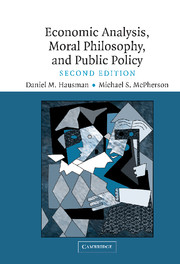Book contents
- Frontmatter
- Contents
- Preface
- INTRODUCTION
- I RATIONALITY AND MORALITY
- II WELFARE AND CONSEQUENCES
- 7 Utilitarianism and Consequentialism
- 8 Welfare
- 9 Efficiency
- III LIBERTY, RIGHTS, EQUALITY, AND JUSTICE
- IV MORAL MATHEMATICS
- CONCLUSIONS
- Appendix: How Could Ethics Matter to Economics?
- Glossary
- References
- Index
9 - Efficiency
Published online by Cambridge University Press: 06 July 2010
- Frontmatter
- Contents
- Preface
- INTRODUCTION
- I RATIONALITY AND MORALITY
- II WELFARE AND CONSEQUENCES
- 7 Utilitarianism and Consequentialism
- 8 Welfare
- 9 Efficiency
- III LIBERTY, RIGHTS, EQUALITY, AND JUSTICE
- IV MORAL MATHEMATICS
- CONCLUSIONS
- Appendix: How Could Ethics Matter to Economics?
- Glossary
- References
- Index
Summary
Mainstream economists evaluate economic institutions, policies, and outcomes by asking whether they make people better-off. Given their theory of welfare, they are asking how well institutions, policies, and outcomes satisfy preferences. Yet few economists are utilitarians. Most normative economists deny that evaluations should be based on comparisons of how well satisfied are the preferences of different individuals. Following Robbins (1935, ch. 6), mainstream economists typically regard interpersonal comparisons as untestable subjective value judgments that are scientifically illegitimate. Though we have qualms about these arguments, in Chapter 7 we endorsed the conclusion that interpersonal comparisons of welfare are impossible when welfare is interpreted as preference satisfaction. We take this result as a further reason to question the identification of welfare with the satisfaction of preferences. For people do, in fact, make interpersonal welfare comparisons – and they need to do so. In our view, policy makers need to make interpersonal comparisons, too. They need to be able to compare the consequences of policies for winners and losers in a nonarbitrary way, which is also impossible without some sort of interpersonal comparison.
Welfare economists thus face a serious problem: How can they even make sense of the notion that one economic outcome satisfies preferences better than another if they cannot compare how well satisfied are the preferences of different individuals and cannot add up utilities? Indeed, denying the possibility of making interpersonal welfare comparisons – which is virtually inevitable once one identifies welfare with the satisfaction of preferences and adopts the framework for representing preferences that is accepted in positive economics – largely determines the character of mainstream normative economics.
- Type
- Chapter
- Information
- Economic Analysis, Moral Philosophy and Public Policy , pp. 135 - 156Publisher: Cambridge University PressPrint publication year: 2006



